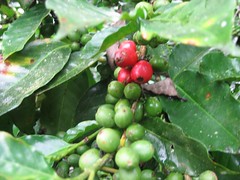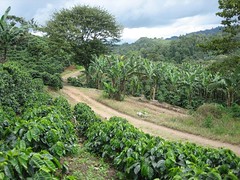As Juan Luis Guerra once hoped "I wish it rains coffee in the field" in Nicaragua it is coffee time and you can feel it in the atmosphere. Yesterday I had the opportunity to go to Jinotega, the department north of Matagalpa in the Honduran border, famous for its shade-grown Arabica coffee. The purpose of the visit was to check on the progress of a School Garden we had helped implement a couple months ago. But as we travelled this mountainous region, I was amazed by how it looks so different now that the coffee is being harvested.
The rural roads look like ant paths, with hundreds of people going back and forth carrying sacks of coffee, food, tools, and guitars. Although the pick of the seasons hasn’t started yet, you’ll be able to find Nicaraguan from all over. Some come from the Atlantic coast where poverty is more prevalent. Others live in the region and spend some time harvesting coffee, then sugar cane and then back to their farms. This region in fact, has been a reservoir of agricultural labour. This is one of the reasons why so many agricultural projects that try to convert these seasonal workers to producers fail.
The rural roads look like ant paths, with hundreds of people going back and forth carrying sacks of coffee, food, tools, and guitars. Although the pick of the seasons hasn’t started yet, you’ll be able to find Nicaraguan from all over. Some come from the Atlantic coast where poverty is more prevalent. Others live in the region and spend some time harvesting coffee, then sugar cane and then back to their farms. This region in fact, has been a reservoir of agricultural labour. This is one of the reasons why so many agricultural projects that try to convert these seasonal workers to producers fail.
The town is bursting and the money starts to trickledown to restaurants, shops, and obviously to the local tavern. There are problem, most of then alcohol related after pay-day, yet the mood is pleasant as the farmers know that all the hard work is finally producing the first fruits and the workers are getting some money to bring back to their families. The farms where the berry pickers work are filled with joy: don’t get me wrong as I’m not saying that coffee picking is an easy, pleasant job. What I’m saying is that to the foreign eye it looks like a romantic painting of blue skies and green landscapes: a resting yet deceiving image from colonial times.
But forget about the Germans and other Europeans who once owned and managed these coffee farms, although there is some left, most farms are now owned and operated by Nicas. So Nica is the music played on the radio, or sang by the workers as they pick the berries. At lunch time, you'll hear a whistle telling you is time for lunch. A Nica lunch of beans, tortilla, cuajada, meat (sometimes), and of course coffee, giving these good-hearted Nicaraguans the energy to keep going.
During the Sandinistas time and to some degree today, you hear many voices that complained about coffee and other monocultures as being promoters of poverty and food insecurity. The rationality of their argument is based on a colonial systems of production that reflect little to today’s reality. Nowdays, the wages for pickers are regulated and there are a wide range of standards for the conditions in which they have to work, guarantying their safety and wellbeing. People also think food security for farmers means producing food, when most of the time they are better off by producing goods to commerce and then buying food.
A quintal (100LB) of dry coffee is being paid at US$120.oo aprox. The coffee price is now recuperating from a two decade low that busted the market for speciality coffees such as shade-grown, fair treaded, organic, etc. Now, there are plenty of farmers that are meeting their ends by growing this berry. So next time you drink a cup coffee, imagine all the bliss that came into bringing it to you.
Salud,
“Give a man a fish; you have fed him for today. Teach a man to fish; and you have fed him for a lifetime”.— Old Chinese Saying
My version: “Give a man a fish; you have fed him for today. Teach a man to sell the fish, so he can also eat some chicken”. – Rafael I Merchan




1 comment:
You version for fish is very good.
I like that,very smart.
Best regards from Croatia!
Post a Comment